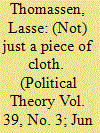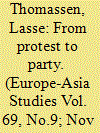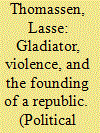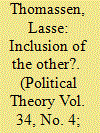| Srl | Item |
| 1 |
ID:
105922


|
|
|
|
|
| Publication |
2011.
|
| Summary/Abstract |
To understand the politics of recognition, one must conceive of it as a politics of representation. Like representation, recognition proceeds at once in a constative and a performative mode, whereby they bring into being what is simultaneously represented or recognized. This structure has paradoxical implications. The politics of recognition is also a politics of representation in the sense that it always involves questions such as, Which representations are recognized? Whose representations are they? The reverse is also true: the politics of representation involves recognition because representatives and representations must be recognized in order to gain authority. In short, we can examine recognition as representation, and there is no recognition without representation, and vice versa. This is demonstrated through a reading of a recent British legal case, Begum, where the issue at stake concerned which representation of Islam should form the basis for the recognition of Islam in the school uniform policy.
|
|
|
|
|
|
|
|
|
|
|
|
|
|
|
|
| 2 |
ID:
156984


|
|
|
|
|
| Summary/Abstract |
This essay analyses the politics of horizontality—a key characteristic of recent forms of protest and activist citizenship—through the case of the 2012–2013 protests in Slovenia. The Slovenian case is illustrative because we can trace the emergence of the Initiative for Democratic Socialism and, subsequently, the United Left from protest through movement to party. Since we believe that horizontality and verticality are present in both movements and parties, we argue against a simple opposition between movements and parties. In particular, we focus on the reasons for the move from horizontalist ways of political organising to vertical structures.
|
|
|
|
|
|
|
|
|
|
|
|
|
|
|
|
| 3 |
ID:
090253


|
|
|
|
|
| Publication |
2009.
|
| Summary/Abstract |
Ridley Scott's 2000 film Gladiator presents a view of the transition from dictatorship to the republic that one also finds in the discourses of certain political leaders today. I argue that we can learn about violence and the founding of a republic from an analysis and, especially, a critique of Gladiator.
|
|
|
|
|
|
|
|
|
|
|
|
|
|
|
|
| 4 |
ID:
073489


|
|
|
|
|
| Publication |
2006.
|
| Summary/Abstract |
In his most recent work, Jürgen Habermas has proposed a deliberative account of tolerance where the norms of tolerance-including the threshold of tolerance and the norms regulating the relationship between the tolerating and the tolerated parties-are the outcomes of deliberations among the citizens affected by the norms. He thinks that in this way, the threshold of tolerance can be rationalized and the relationship between tolerating and tolerated will rest on the symmetrical relations of public deliberations. In this essay, and inspired by Jacques Derrida's work on the concept of hospitality, I propose a deconstructive reading of Habermas's writings on tolerance. I argue that Habermas is ultimately unable to provide a rational foundation for tolerance and that his conception of tolerance encounters the same problems he is trying to avoid, namely, the contingency of the threshold of tolerance and a paternalistic relation between tolerating and tolerated. Yet, contra Habermas, the deconstruction of tolerance does not result in its destruction and does not force us to give up on the concept and practice of tolerance.
|
|
|
|
|
|
|
|
|
|
|
|
|
|
|
|